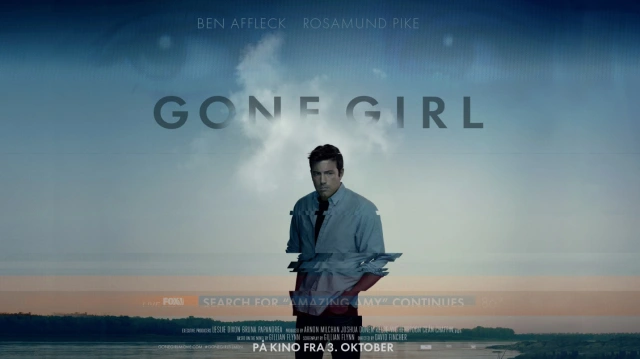Gone Girl (2014)

“Gone Girl,” directed by David Fincher and based on Gillian Flynn’s bestselling novel, is a masterfully crafted psychological thriller that explores the complexities of marriage, media influence, and the darker aspects of human nature. Released in 2014, the film stars Ben Affleck as Nick Dunne and Rosamund Pike as his enigmatic wife, Amy Dunne. With a stellar cast that includes Neil Patrick Harris, Tyler Perry, and Carrie Coon, “Gone Girl” delves deep into the intricacies of a seemingly perfect relationship that spirals into a web of deceit and manipulation.
The narrative unfolds on the morning of their fifth wedding anniversary when Nick returns home to find that Amy has mysteriously vanished. As the police investigation begins, Nick’s demeanor becomes increasingly suspicious, and the media quickly turns him into a prime suspect. The story is presented through a dual perspective: Nick’s present-day experiences intertwined with Amy’s diary entries that recount their relationship’s early days, painting a portrait of a couple whose love story is far more complicated than it appears.
One of the film’s most striking elements is its exploration of the media’s role in shaping public perception. As the investigation intensifies, the media frenzy surrounding Amy’s disappearance highlights how quickly public opinion can turn, often driven by sensationalism rather than truth. Fincher expertly captures this dynamic, reflecting the societal obsession with crime stories and the way narratives can be manipulated. This critique of media sensationalism adds an additional layer of complexity to the film, making it a relevant commentary on contemporary culture.
Rosamund Pike’s performance as Amy is nothing short of extraordinary. She embodies the character’s multifaceted nature, seamlessly transitioning from the adoring wife to a chilling mastermind. Pike’s portrayal of Amy showcases a woman who is both vulnerable and calculating, revealing the depths of her character as the plot unfolds. Her ability to convey a range of emotions—fear, anger, and ultimately, a chilling calm—renders Amy one of the most memorable characters in modern cinema. Pike’s performance earned her an Academy Award nomination, and it is a testament to her skill that she can evoke both sympathy and horror.
Ben Affleck’s portrayal of Nick Dunne complements Pike’s performance, effectively capturing the character’s internal struggle. Nick is presented as a flawed but relatable protagonist, and Affleck navigates the complexities of his character’s emotions with subtlety. As Nick grapples with his growing isolation and the scrutiny of the media, his vulnerability becomes increasingly evident. The film’s tension hinges on the audience’s evolving perception of Nick—initially a sympathetic character, he becomes increasingly ambiguous as the narrative progresses.
Fincher’s direction is pivotal in creating the film’s unsettling atmosphere. Known for his meticulous attention to detail, Fincher employs a dark and moody aesthetic that enhances the film’s themes of deception and betrayal. The cinematography by Jeff Cronenweth contributes to the film’s psychological tension, using shadow and light to reflect the characters’ inner turmoil. The haunting score, composed by Trent Reznor and Atticus Ross, amplifies the film’s unsettling tone, drawing viewers further into the narrative’s complexity.

The screenplay, co-written by Flynn herself, is sharp and incisive, filled with biting dialogue that reveals the characters’ intricacies and the facade of their relationship. The interplay between Nick and Amy serves as a microcosm of broader societal issues, particularly the expectations placed on marriage and the façade of perfection. The film challenges the notion of what it means to be a successful couple, exposing the hidden resentments and disappointments that can lie beneath the surface.

As the plot unfolds, the layers of deception unravel in a shocking climax that forces viewers to reconsider everything they thought they knew about the characters. The film’s ending is both provocative and unsettling, leaving audiences grappling with questions about morality, trust, and the lengths people will go to maintain appearances. It raises pertinent questions about the nature of love and the dark undercurrents that can exist in even the most seemingly idyllic relationships.

In conclusion, “Gone Girl” is a compelling psychological thriller that expertly combines a gripping narrative with profound social commentary. David Fincher’s direction, coupled with Rosamund Pike’s extraordinary performance, creates a film that is as entertaining as it is thought-provoking. The exploration of marriage, media manipulation, and the duality of human nature ensures that “Gone Girl” remains a significant film in contemporary cinema. As it invites viewers to confront the darker aspects of love and the complexity of truth, it leaves an indelible mark that lingers long after the credits roll. “Gone Girl” is not just a tale of a missing woman; it is a piercing examination of the narratives we construct and the truths we choose to conceal.











